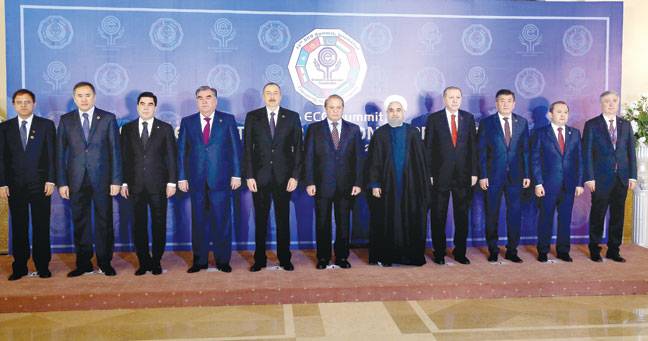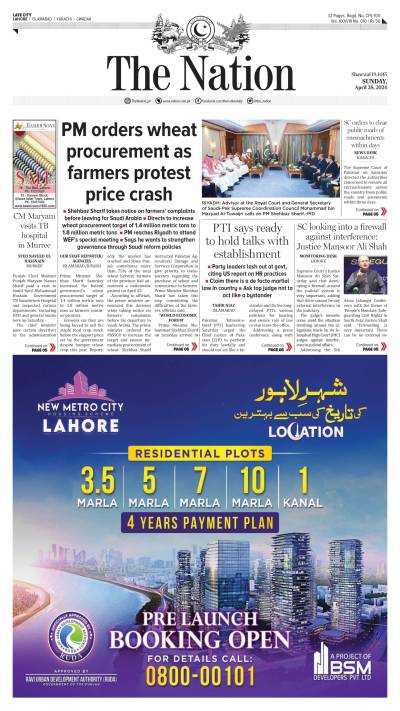ISLAMABAD - Vision 2025, adopted by the Economic Cooperation Organization Summit on Wednesday, resolves to make the organisation better equipped to face challenges and advance the fundamental principles of the group.
The Vision Statement 2025 released by the ECO Secretariat on Wednesday said: “In view of the rapid socio-economic, political and scientific developments taking place at the regional and global levels, and taking into account the opportunities and challenges before the organization, it is envisioned that the ECO will pave the way to a territory of integrated and sustainable economies as well as free trade area achieved by highly-educated societies and improved governance through enhanced cooperation.”
“We resolve to make the organization, better equipped to face challenges and advance the fundamental principles of the organization to expand project-based economic activities and develop and strengthen the ECO institutions, enabling them to play a proactive role in realizing the objectives of the organization and implementing the vision. We also recognise the need to strengthen the ECO Secretariat for realization of our vision,” the statement reads.
The core principles highlighted in the vision statement are sustainability, integration and conducive environment.
Also Read: ECO leaders vow to promote multi-faceted connectivity
Regarding sustainability the statement reads, “we acknowledge that any long-term benefits to the peoples of the region through social and economic programs depend on long-term sustainable progress, therefore we express our resolve to support the global efforts aimed at addressing the challenges facing the international community.”
“We share the goals and targets defined by the United Nations Sustainable Development Summit in September 2015 as enshrined in its outcome document ‘Transforming our world: the 2030 Agenda for Sustainable Development’,” it adds.
“In doing so, we will give priority to the immediate needs and concerns of our region and its peoples as identified in this vision. To this end, we will welcome partnerships with the relevant international and regional organizations,” the statement reads.
Regarding integration the statement reads, “we are now a region representing a combined population of over 440 million people and have achieved noteworthy results in the economic field, such as increasing economic growth and reducing poverty as well as increased trade and investment flows over the past years.”
On the issue of creating a conducive environment the statement reads, “Conducive economic environment in the region is a pre-requisite for stimulating national economies of the member countries, boosting intra-regional cooperation and integration into the global economy.”
Underlining areas of cooperation the statement reads, “To materialise the enhanced regional cooperation for economic growth and development in line with this vision, we are determined to develop and implement strategies in the following areas during the next decade: Trade, transport and connectivity, energy, tourism, economic growth and productivity, social welfare and environment.”
Concerning trade, it states as strategic objective the need to, “double intra-regional trade, increased ECO share in the global trade and specifically exports, increased share in global trade and the need to tap regional trade potential for economic growth.”
The statement, in the areas of transport and connectivity envisions, maximizing “connectivity, mobility and accessibility by making major ECO transport corridors commercially viable and operational and contribute to achieve goals of information society in the region.”
In the energy sector, the statement envisions, “enhance[ing] energy security and sustainability through wider energy access and trade within the ECO region and beyond.”
In tourism sector, it has been envisioned to “establish a peaceful and green tourism destination with diverse products and high quality services in the region.”
For achieving economic growth and achieving productivity, the statement envisions “achieving long-term high-level growth, knowledge and information-based production through increased contribution of research and development (R&D), entrepreneurship, and involvement of private sector, increased women participation and SMEs.”
As per the vision statement, “A Regional Agricultural Trade Forum will be established to provide a basis for dialogue on agricultural trade policies and joint research on agricultural policy issues under the framework of the existing general trade mechanisms in the ECO.”
Also, “An Agricultural Trade Information System will be established for the region. Agricultural export potentials of the member countries and intra-regional agriculture trade potentials will be identified and realized.”
“Development of quality infrastructure, standards, laws and regulations to make the region an investment friendly atmosphere for green industries and services will be promoted,” the statement envisions.
“Capital flows, and technology transfers from within and outside ECO members will be encouraged. New industrial solutions including industrial revolution 4.0 will be utilized to address emerging needs,” it adds.
“The agreement on promotion and protection of investment among ECO member countries will be operationalized and its membership will be increased. Legal regimes and mechanisms to enhance investor protection will be improved; capacity building programmes for investment promotion agencies of the member countries will be prepared and executed,” the statement reads.
On the subject of social welfare and environment, it is envisioned, “To increase standard of living, quality of life, economic welfare and well being of people through adopting social protection and environment preservation policies in the region.”
The “ECO Vision 2025” will be the main agenda of the organization for the decade (2015-2025). “We therefore make every effort to realize the goals and targets set forth in this vision. Follow-up and review mechanisms shall be set in place to ensure its continued relevance and effective implementation,” the statement reads.
The statement further reads “Implementation of this vision will be streamlined through ‘Implementation Framework’. The ‘Implementation Framework’ delineates goals, activities and timelines to achieve the objectives of the ECO Vision.”
“The Regional Planning Council, being responsible for evolving Annual Work Plans for realizing the objectives of the organization shall consider the vision as guiding document and shall endeavour to align its mandates with the goals and objectives embedded therein and to ensure successful implementation of the ‘ECO Vision’. The ECO Secretariat shall prepare background documents on each sector based on the vision and its annex (Implementation Framework), for consideration of RPC during its meetings,” the statement reads.
“The relevant sectoral ECO Ministerial meetings shall also streamline their agendas and decisions for effective implementation of ECO Vision and its ‘Implementation Framework’,” it adds.
On the topic of monitoring and evaluation, the vision statement reads, “Following the adoption of this vision, the ECO Secretariat shall develop as part of the ‘Implementation Framework’, in consultation with the member countries, indicators/benchmarks for the necessary assessment of implementation of the vision document.”
“The ECO Council of Ministers shall have an oversight on all aspects of the vision document. The ECO Secretariat shall include in all regular meetings of the ECO Council of Ministers, an agenda item titled “Vision Implementation; Progress and Assessment” in which the COM will consider the report on ECO Vision’s implementation including on its progress and obstacles. Accordingly the ECO Secretariat will implement COM decisions/recommendations,” it adds.
“ECO Secretariat will undertake ‘Vision Review’ exercise after every three years assessing the progress and achievements based on the bench marks prepared and put it before the RPC for consideration and COM for assessment, advice and decisions on adjustments if needed, within the expected outcomes of the vision and Implementation Framework,” the statement reads.
“A final review process will be initiated by the secretariat one year preceding the target year of 2025 in close collaboration and with full involvement of ECO member countries in which an overall assessment and a comprehensive review will be done with the view of giving necessary inputs and a sense of direction for the next vision,” it adds.
Concerning financial framework, the statement reads “To implement the ‘ECO Vision 2025’ in a meaningful manner, there is a need for sustained and regular funding for its implementation. Adequate and predictable resource allocation is central for ECO Vision implementation. Therefore, we resolve to create an ‘ECO Vision Fund’ to facilitate the member states to implement the vision. Financial resources for the fund shall come from voluntary grants and other sources. ECO Trade and Development Bank will be engaged as appropriate.”
On organisational structure, the vision statement reads, “Effective and successful implementation of the ‘vision’ will require more efficient ECO structure. To meet this end ECO Secretariat as well as ECO special agencies and regional institutions will be streamlined and decision-making processes will be strengthened through carrying out necessary institutional reforms on the recommendations of the CPR.”






